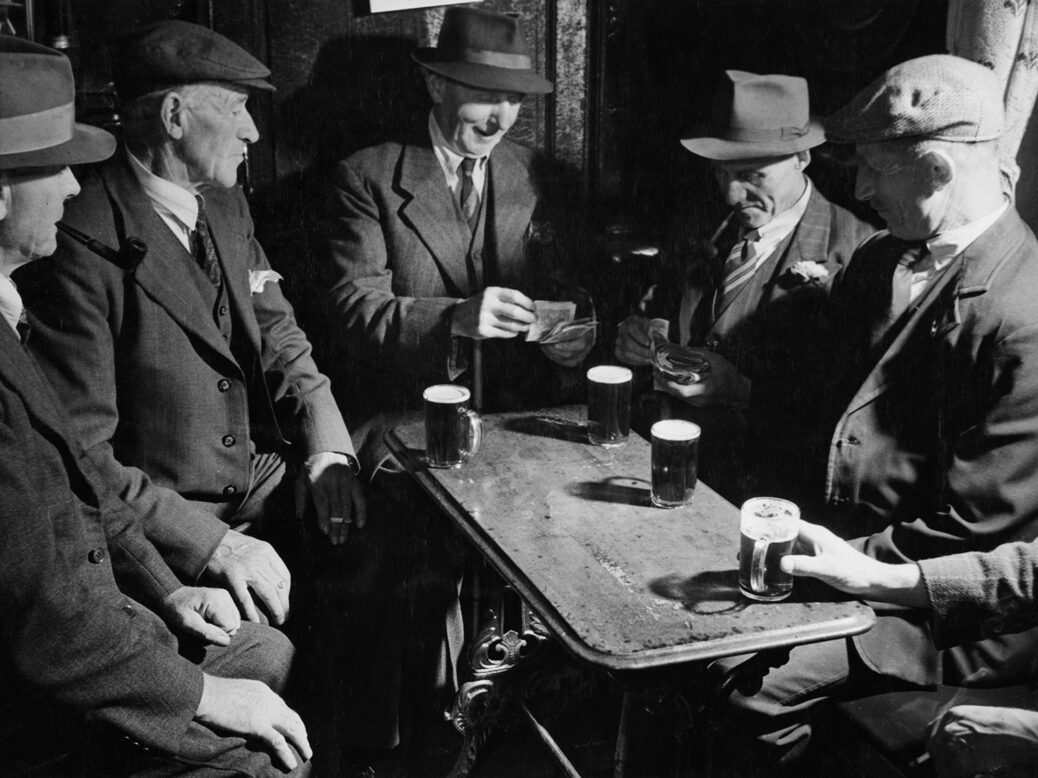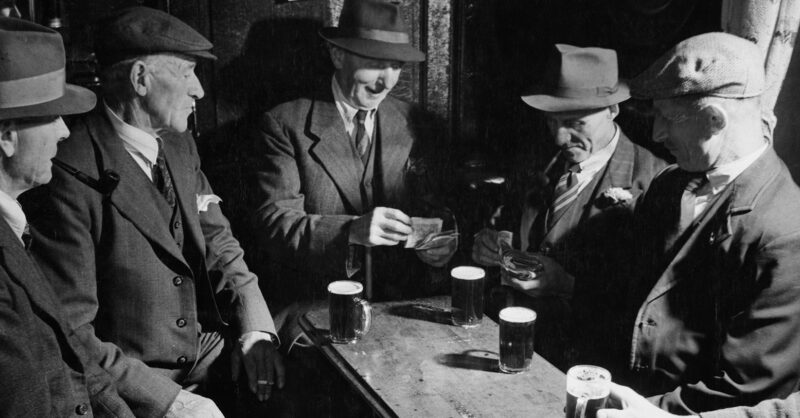
Photo by Frederic Lewis/Archive Photos
In the Warren House Inn on Dartmoor, the log fire has been kept alight since it was last lit in 1845. At Ye Olde Fighting Cocks in St Albans, Britons have supped ale since the eighth century. But the British pub, once the timeless refuge of our culture, is dead.
This terrible news was revealed in the latest research published by pollsters YouGov yesterday. The British pub – and with it, British society – is finished. You can still visit a British pub, you can still have a pint, but a growing majority now think you should have to queue up for it.
These results came from a representative survey of 5,914 British adults, although their responses suggest many of these people do not merit that description. Rather than follow the ancient system of everyone just leaning on the wood and allowing the barkeep to serve their clients as they see fit, fully 40 per cent of respondents believed the best system for ordering drinks in a pub should be to “form a single-file queue”.
Queuing in pubs combines the worst elements of communism – yes, the very worst elements – without any of the good stuff, like free housing or hastily built nuclear power stations. Why not turn all the motorways into single lanes, if such a simple, linear meritocracy is to be imposed on the population? We must not stand for this. Pubs should be required to install “NO QUEUING” signs at every bar. This is not who we are as a country.
Whether you were born here or have decided to become British, getting served in a pub is the best practice for the polite but quietly intense competition of our society. It recognises that meritocracy is never really possible. Lots of other people either got there first, or will be favoured ahead of you, unfairly and for reasons that will never be made clear. To succeed, you must exercise the core British skill of insinuation, of seeking a position while affecting not to be in the least bit bothered by whether you achieve it.
Techniques differ but, as with most things in British society, it is often best to approach sideways. Once the bar is within reach, a hand is placed casually upon its edge; this is performed as a relaxed lean, as if it was not the establishment of a key tactical position. An elbow or knee can then be interposed, again casually and without jostling anyone. Once the beachhead is fully established the waiting customer can turn, as if surprised, as if they haven’t spent several minutes carefully navigating the spaces between other people.
At the bar, there is a further performance of core British tenets. You do not tell the publican you are next; this is the kind of thing an American would do. Eye contact with the barperson should be accidental, friendly without being overbearing, a smile or nod that shows you are ready for a beer at a time convenient for them. Rudeness is punishable: if you are a middle-aged man and you stare intently at a barmaid, you will not be served, nor should you be. And then when you are asked for your order, you of course hand over the privilege to the person next to you, like a thirsty Raleigh throwing his cape upon a puddle.
Subscribe to The New Statesman today from only £8.99 per month
The polite competition of the pub crowd is far more civilised than the brutal numerocracy of the queue. This gentle chaos assumes that people are good, and gives them the opportunity to confirm it, to make space for those less able to reach the bar, to arrange themselves with nods and winks. The queue assumes that everyone is bad.
Why has Britain succumbed to the monstrous idea of queuing for a pint? Is it the result of a population infantilised by the internet? Perhaps, but the respondents who most favoured queuing were at either end of the age distribution – those aged 18-24 and 65+ were most likely to think it would be better if they were herded into a line. Interestingly, Labour and Conservative voters were more likely to favour queuing, while Lib Dem and Reform voters were more likely to favour a free-for all.
My own theory is that this is the result of a society that has been aggressively de-professionalised by market forces and technology, in which formerly well-respected jobs such as driving a cab or staffing a shop have been replaced by a low-paid precariat whose presence is temporary and who, having seen their autonomy outsourced to software, have no real interest in the job anyway. You don’t see a GP, you see a physician associate; your conveyancing won’t actually be done by a lawyer; your news comes from social media; you write to your MP and get a reply from ChatGPT. Capital has dissolved the old structures of employment status, and now no-one trusts a barman to decide who gets the next round.
In other, more mechanistic areas of life – the post office, the airport – there are practical reasons to queue. But the pub is not a practical place. What is at the end of the queue does not matter. It’s just a beer. The amiable hubbub is the point.
[See also: Coldplay are finally cool]
Content from our partners

